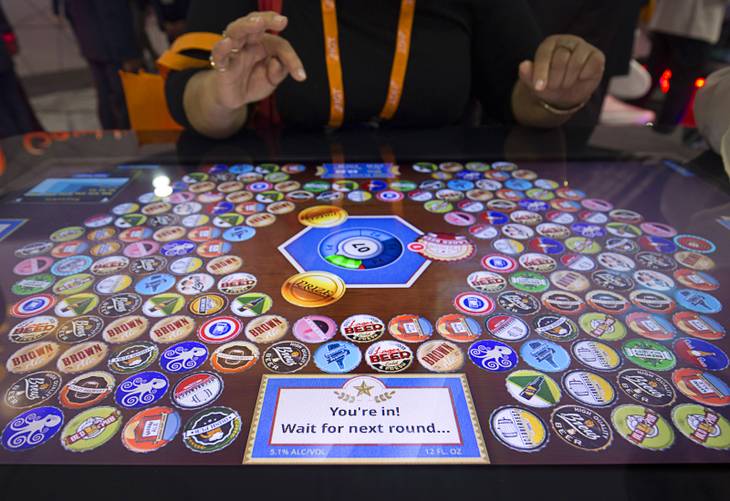Related news
Getting new casino games in front of gamblers faster is the idea behind a change in regulations being considered by the Nevada Gaming Commission on Thursday.
The commission will meet in Carson City to vote on amendments to regulations that would create a New Innovation Beta (NIB) process intended to speed up the development of new games by letting game makers quickly test their products in the real world.
At present, game makers use field trials to see if games can technically stand up to real-world use and to see if gamblers find them easy and fun to play. However, games are required to meet all of Nevada’s regulatory standards before field trials can begin.
The NIB process does away with that requirement.
“Here we can essentially skip that and allow the NIB to commence,” said A.G. Burnett, chairman of the Nevada Gaming Control Board. “So it’s like a fast-track field trial.”
While the standards will be lowered for consumer testing, Jim Barbee, chief of the technolgy division of the Control Board, said the NIB won’t be a free-for-all.
“First, the games must be able to display an outcome and, of course, deliver that outcome,” Barbee said. “All the financial transactions from the time you put the cash in to when you get something out of it have to work properly.”
Another change is whether gamblers know they are actually testing a new game. During the regular field tests, Burnett said, gamblers may be told but it’s not mandatory.
That’s not the case with NIB.
“With NIB there will be notification for the patron, and there will be a cordoned off or separate area depending on what the device or product is,” Burnett said.
“And it will be a situation where the message to the patrons would be ‘Hey, come try this new device or game and know that it’s beta and not fully approved. But it’s being tested and we would like to get your input.’ So NIB patrons will be fully aware that it’s a new innovation that may not be fully vetted yet.”
As chairman of the Gaming Control Board, it will be Burnett’s decision to allow a manufacturer into the NIB process.
“When we receive a request for an NIB product placement, and if we grant it, we’ll send a letter with all parameters telling licensees what to do and also give them the opportunity if there’s a problem to pull it and stop the NIB. And of course, the patron would be made whole if there’s a problem,” Burnett said.
Barbee said the overall time for getting a new game approved, from the first application to the final sign off, may end up being similar to what it is now. However, the chance to put games in front of users sooner, rather than later, is the major benefit of the change.
“That’s a definite perk to the process,” Barbee said. “The manufacturers get real-world data instead of information from focus groups.” It’s something manufacturers say they want.
“As it stands, after getting the technical certification, you still have to have field trials,” said Eric Meyerhofer, CEO of Gamblit Gaming, which is working to get its skill-based video games into casinos. “And so that’s planned out, and then you have to report on that, and then you have to have two public hearings.”
“You’re talking several months of additional delay to get products on floor and get player’s reactions. But with the NIB, you can vet products while they’re out on the floor and that’s better for everyone.”
Marcus Prater, executive director of the Association of Gaming Equipment Manufacturers, which worked with the control board to develop the new regulations, said getting data sooner in the process only makes sense.
“So, the manufacturer has invested all this time and R & D energy to get the game approved and then the final approval is the field trial,” he said.
“Depending on what’s new about the operating system, or the software or the hardware, the field trials can last multiple months,” Prater said. “You have to have the game on the floor in multiple casino locations and only then after that process do you finally get formal approval to start selling the game in larger numbers.”
“Under the new scenario, which in our opinion shows that the control board is open to allowing all sorts of new tech into Nevada gaming, if a manufacturer has a concept that’s unique … the manufacturer can test it for player acceptance and for software stability and for all of the things that would be required to make it commercially successful first, rather than go through a long process first.”
In addition, Prater said, the process was due for a change.
“The Nevada field-trial model has not changed significantly in many years,” Prater said. “And now Nevada is really taking the lead on opening the door to new ideas. So Nevada has gone from (a process) that hasn’t changed materially in many years to where now it’s really in a position to be the first state to get some of this tech.”
Other manufacturers selling skill-based games are looking forward to the taking advantage of the new regulations.
““I’ve spoken to Chairman Burnett, and I think it’s a great plan,” said Blaine Graboyes, CEO of GameCo. GameCo recently received approval from regulators in New Jersey to roll out its skill-based video game gambling machines in that state. Graboyes said it’s important that regulators everywhere recognize the need for speed.
“It’s needed,” Graboyes said. “It’s really going to help drive the industry and anything that can be done to bring more innovation more quickly is absolutely critical. “It’s a question of how we take advantage of it and what is best way to come to the Nevada market as soon as possible.”
